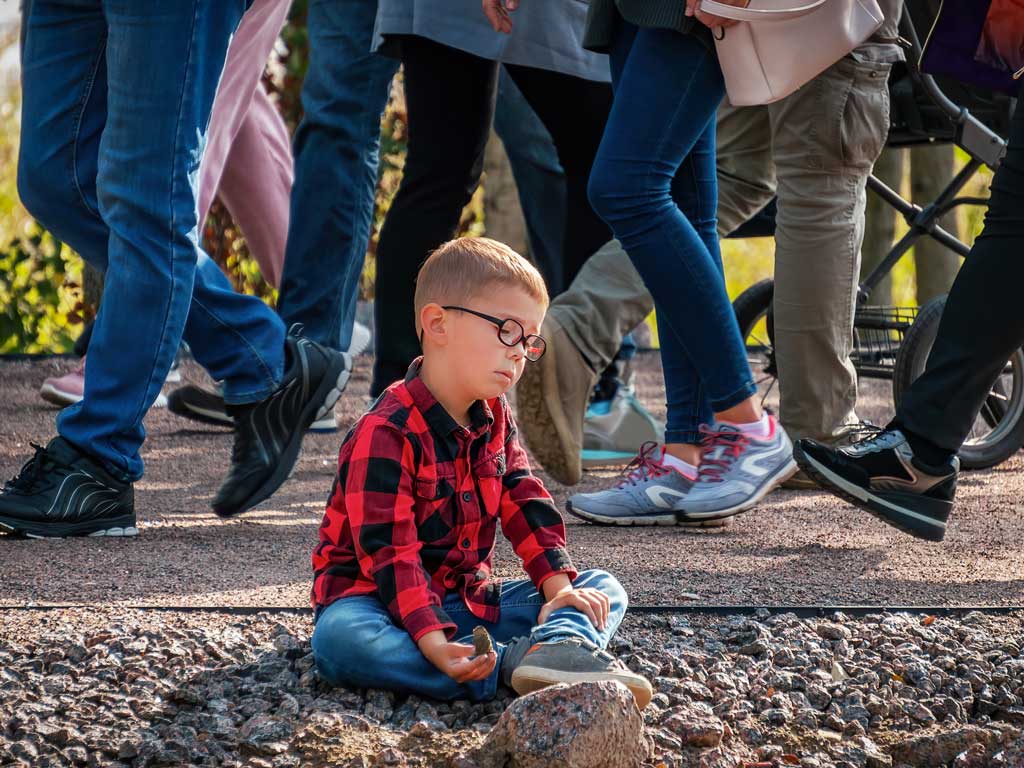by Brooke Clayton
With summer in full effect, your family is busy planning outings and adventures. A vacation, trip to the water park, site seeing; all are activities are filled with loads of fun, but also loads of people. It may be difficult to spot your little one surfing or running through the crowd. Chances are someone might have a hard time keeping up or staying within sight.
A family’s worst nightmare is having a child lost or missing. It is crucial to develop a game plan with your family to tackle these episodes. Coach your family on ways to prevent a missing child, as well as what to do if they get lost. Ready? Go Team!

Toddlers
Everything is interesting and exciting; the grass on the ground, clouds in the sky, new faces, new smells. Their itty-bitty fingers seem to graze and grasp everything in sight, and their feet seem to follow every path available. With your youngster exposed to new environments, it will spark lots of curiosity. Here are a few things you can do to prepare your toddler for an outing.
Attire: Dress your cuties in brightly colored or uniquely patterned clothing so they are easy to spot. If lemon-yellow is not part of your child’s wardrobe, opt for something distinct like a red baseball cap, a pair of sunglasses, or bright hair pins. Memorable items will make it easy to spot your child in a crowd or describe them should they get lost.
Identification Labels: Provide your children with basic information they can use to identify themselves. Practice your child’s and family member’s full names. If they are able to retain the information, practice phone numbers. Create labels on the inner clothing tags of your child’s clothing or hats. You can also write the information down and stick them in your child’s pocket.
Photos: Snapping a photo of your child with your cell phone is the quickest way to provide their full description. Displaying a photo of your child in their current outfit will communicate exactly what they look like, and will be clearer than a verbal description. Keep a recent photo of your child in your wallet, such as a school photo, or on your phone as a back up.
Holding Hands: Grasping onto your child’s hand is one of the most efficient ways of keeping them close to you. There is also a barrier formed. As soon as your child’s hand slips out of your grip, you will feel it. If you have multiple children, you can purchase or make walking ropes. Have each parent hold one end of the rope and the children grip onto a spot or ring in the middle.
Children
Unlike toddlers, older children have longer attention spans and are clearer communicators. Instead of running off into the crowd while you’re left to chase, they may become distracted and wander off thinking you’re right behind them, or get left behind. Children feel comfort knowing their parents are around and they understand the danger in getting lost, although it won’t stop them from sudden distractions.
Buddy System: If you’ve got multiple family members or friends tagging along, create a buddy system. When your children are in a pair, it decreases their chances of getting lost. Assign your child a buddy, and explain that they both will be held responsible for one another.
Whistles: Hand out pocket whistles or string them on a lanyard for your child to wear around their neck. Whistles are a great tool for big trips like amusement parks. Let your children know that these specific whistles are to be used for emergencies only, and that they are not to be misused. Have the children blow into the whistle if they are lost or cannot find their buddy.
Meeting Spots: It’s always a great idea to be ahead of the game. Come up with a designated meeting spot in case someone wanders off and loses their buddy or group. Once your child has observed the area, blew on their whistle, and still cannot find their buddy, have them go immediately to the meeting spot. The nearest bathroom, snack shop or easily locatable area makes great meeting spots.
Sticking to the System: Most children will become afraid once they realize they are lost and may run frantic in search of you. Speak with your children ahead of time and rehearse the agreed upon system for getting lost. Have your child stick to the system. For example scanning the area for the lost group, blowing the whistle 10 times, then walking over to and waiting at the meeting spot. Once the system is bulletproof, you can feel confident that your child will know what to do.
Teens
It’s highly likely that your teenager is craving independence. When you’re strolling through the mall, they may take every opportunity to drift away from you. Sometimes that’s a great thing, and a natural tool for developing social skills. Giving them room to spread their wings will build confidence when it’s time to fly solo. Although our teens are developing into responsible, mature adults, they aren’t quite there yet. Till then, apply these tips to offer them some space, but to also make sure they are home in time for dinner.
Checking in: If you allow your teen to visit a different store in the mall or to split-up during shopping trips at the department store, come up with an appropriate time for checking in. Suggest a phone-call within fifteen minutes of the trip or if your teen jumps from one store to another. Communication is key; having updates is crucial. This will also be a great exercise to build confidence and trust in your teen.
Time-limits: Adding structure to an outing is always a great thing. If you’re at a huge event like a carnival or a fundraiser, allow your teen to mingle, but it may be smart to set certain time-limits. Communicate the designated time that your teen will have to be back in the meeting spot for departure. “You have two hours, meet us back at the table at 7:30pm, this is the agreed upon time.”
Cell Phones: If you haven’t already invested in a cell phone for your teen, this may be the right time. As your teen explores and ventures out, providing certain tools, like a cell phone, may be beneficial. With the growing rate of cell phone use, it is very difficult to locate a pay phone anywhere. Consider a cell phone designated for outings where you and your teen may be separated. In this case, a prepaid phone may be a great, affordable alternative to a cell phone contract for emergencies. Store it in your vehicles glove compartment till it is needed.
Details: Be sure to get all the details about where and whom your teen will be with. For instance, if the family is going to the movies, and your teen is going to see a separate film with a few friends, it’s a good idea to know who he/she is with. In case your teen does not check-in or respond to your calls, you can reach that contact. This may also help out if your teen is missing or an incident occurs; it’s always important to know who they are with.
Tips for Parents
When your child goes missing, it can be a very frightening thing—but you don’t want to freak-out or lose focus. Running around screaming your child’s name twenty times over will only add pressure to the situation. You should never panic.
Teach your children how to identify Policemen, Firemen, Lifeguards, Security Guards or Military Personnel. Also give them hints on whom to approach for help; individuals in uniforms or name tags.
Just like you would do with a fire drill escape plan, rehearse your own individual family plan for what routine steps you should take if a child gets lost.
Explain that when your family gets together, the family is like a team, and that everyone watches out for each other.
Teach your children to kick and scream if any stranger uses physical force or interacts with your children in an aggressive manner.





